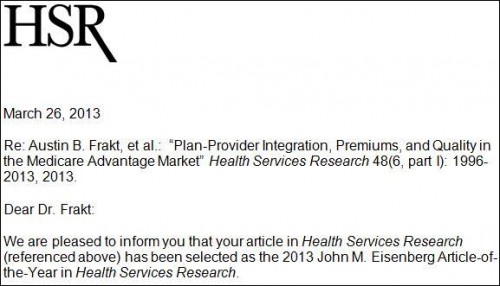My colleagues Steve Pizer, Roger Feldman, and I are honored that our paper “Plan-Provider Integration, Premiums, and Quality in the Medicare Advantage Market” has been chosen as the 2013 John M. Eisenberg Article-of-the-Year in Health Services Research (HSR). The work would not have been done without the support of a contract with the Attorney General of the Commonwealth of Pennsylvania, for which we are grateful. We also thank the HSR Co-Editors-in-Chief and the Senior Associate Editors who made the selection. Prior award-winning papers are listed here.
The paper assesses the relationships between plan-provider integration (i.e., plans and providers that are owned or controlled by the same entity) and quality, premiums, and benefits. The study is relevant to the developing health industry landscape because the Affordable Care Act includes incentives for plan-provider integration, which is therefore expected to become more prevalent.
The key findings of the paper are that Medicare Advantage (MA) plans that are fully integrated with providers offer higher quality, relative to plans that are not integrated with providers. However, controlling for their quality, such plans charge higher premiums. Finally, we found no evidence that integration is associated with more generous benefits.
You can read a bit more about the paper in this blog post, or click through for the abstract and full paper (gated).
We found that integration is associated with an increase of $28 per month in premiums and a monetized increase of just under $8 per month in quality. Consequently, about 70 percent of the total premium difference between integrated and nonintegrated plans is not attributable to quality. Some or all of this premium increase could be associated with benefit enhancements by plans, but we did not observe a statistically significant increase in benefit generosity with integration among the subset of benefit variables we examined. An alternative possibility is that higher premiums for integrated plans are related to higher market power commanded by those plans (whether due to integration or a causal factor of it). Because we did not examine all possible benefits, we cannot completely distinguish between these two possibilities, and that is a natural focus for future investigation.
Receiving recognition for the award on behalf of my colleagues is another reason for me to attend the AcademyHealth Annual Research Meeting, though I was planning to go anyway. If you’re a health services researcher or very interested in the field you should go too. And if you do, please say hello.



